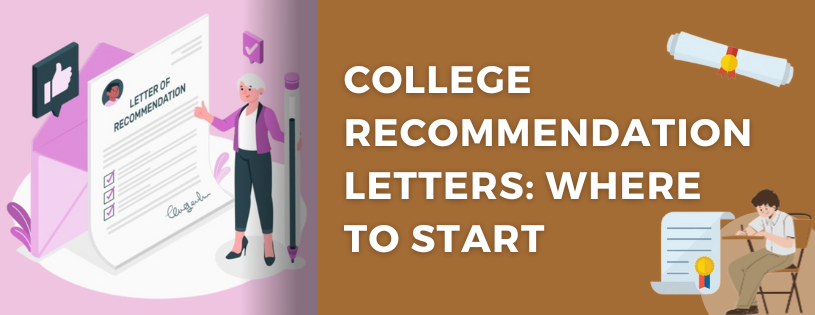Navigating the College Application Journey: A Student's Comprehensive Guide to Recommendation Letters
Embarking on the college application journey is a thrilling yet challenging adventure, and one often overlooked aspect is the recommendation letter. In this blog post, we'll delve into the significance of recommendation letters, offer practical advice on selecting the right teachers and counselors, and provide insights into streamlining the entire process. Our mission is to not only underscore the importance of these letters but also to guide students in navigating this crucial aspect efficiently.

Explore the SAT Course Book a Free Trial Session
Understanding the Significance of Recommendation Letters:
As per the National Association for College Admission Counseling (NACAC), a staggering 87% of colleges assign considerable importance to recommendation letters. These letters transcend grades and test scores, offering colleges a holistic perspective on your personality, character, and potential impact on their campus community.
Starting Early: Crafting Your List of Potential Recommenders:
Don't let recommendation letters become an eleventh-hour stressor. Begin the process in junior year by identifying teachers who know you well and can provide rich insights into your academic journey. Consider those who align with your intended major or have witnessed your growth over the years.
Reaching Out Early: Cultivating Relationships with Counselors and Teachers:
Initiate meaningful conversations with your college counselor early on. Discuss your college list, application strategy, and aspirations. Simultaneously, approach potential letter writers, ensuring they have ample time to compose thoughtful and comprehensive letters. Expressing gratitude for their time and effort can go a long way.
Providing Context: A Key to Crafting Personalized Letters:
To aid your recommenders, offer additional context such as a resume or notable achievements. This proactive step helps them highlight specific accomplishments, painting a vivid picture of your capabilities. Timely and complete submission of any requested materials is crucial for a seamless process.
Dive Deeper with Additional Resources
The Truth About Recommendation Letters:
In college admissions, grades and test scores provide a foundation, but recommendation letters offer a vital holistic view. These letters, a blend of "hard factors" and "soft factors," play a pivotal role in shaping an applicant's profile.
Key Points:
- Role of Recommendation Letters: Provide insights into the applicant's character and academic prowess, offering a comprehensive perspective for admissions officers.
- Submission Requirements: Most selective colleges require one to three recommendation letters, typically from a guidance counselor and a teacher, submitted electronically through school-specific supplements.
- Strategic Approach: Building relationships with teachers and counselors early on is crucial. Identifying recommenders before junior year's end and prioritizing those aligned with your intended major adds weight to the application.
- Timing Matters: Initiate recommendation requests at the end of junior year or the beginning of senior year to allow teachers ample time for thoughtful and comprehensive letters.
- Effective Request Tips: Clear instructions, necessary materials, and avoiding requests from well-known individuals enhance the recommendation letter process.
- Gratitude Expression: A thank-you note post-submission acknowledges the effort and time invested by teachers.
Selecting Teachers to Write Letters of Recommendation:
Colleges often request letters of recommendation from teachers to gain insights into students' characters and academic performances. At IvyWise, we advise initiating requests before junior year concludes, following up at the start of senior year for ample preparation time and priority consideration.
Selecting the Right Teacher:
– Eleventh Grade Teachers: Ideal for higher-level course insights and multi-year familiarity.
– Relevance to Goals: Choose teachers aligned with your academic aspirations; some programs have specific requirements.
– Read and Follow Directions: Ensure compliance with each college's recommendation letter specifications.
Emphasizing Character:
– Character Assessment: Letters provide a holistic view, showcasing interactions, preparation, classroom engagement, campus contributions, and activity dedication.
– Quality Over Familiarity: The teacher who knows you best may not be the one where you excelled academically; prioritize a teacher who can provide a detailed and positive perspective.
Proper Request Etiquette:
– Early Communication: Approach teachers well in advance, respecting their time and potential multiple requests.
– Timely Submission of Forms: Provide necessary forms, materials, and context promptly to simplify the process for teachers.
– Avoid Insistence: Teachers are not obligated to write recommendations; respect their decision if they express reluctance.
Providing Context:
– Supporting Materials: Supply teachers with a resume and the best representative project, paper, or assignment from their class.
– Submission Instructions: Clearly communicate submission guidelines, such as through the Common Application or hard copy requirements.
Time Management:
– Sufficient Preparation Time: Give both yourself and your teachers ample time for a well-crafted application and personalized letters.
– Gratitude: Express sincere thanks for their time and effort; acknowledgement of their contribution is essential.
How to Get a Great Letter of Recommendation:
Importance of Recommendation Letters:
– Some colleges request two or three recommendation letters to gain a holistic view of applicants.
– Recommendations showcase talents beyond grades, providing real-life examples of personality, character, and relationships in the academic community.
– A well-crafted recommendation can significantly enhance your application, setting you apart from other candidates.
When to Request Recommendation Letters:
– Teachers need sufficient time for thoughtful letters amid their other responsibilities.
– Initiate requests early, preferably at the start of senior year or earlier for early decision applications.
– Provide at least a month's notice to references for completion and submission.
Whom to Ask for Recommendation Letters:
– Refer to each college's application requirements; specific individuals, such as core subject teachers or counselors, may be preferred.
– Seek advice from teachers, counselors, and family members on suitable recommenders.
– Choose a current or junior-year teacher who knows you well, preferably someone aware of your recent achievements and character.
– Consider individuals outside the classroom who can provide insights, such as club leaders or employers.
Ensuring a Positive Recommendation:
– Choose recommenders who express enthusiasm about writing your letter.
– Politely confirm your chosen recommender's comfort level and willingness.
– Refresh teachers' memories with specific details about your achievements, class participation, and projects.
– Provide a resume or "brag sheet" to facilitate a detailed and personalized recommendation.
Recommendation Letter from Counselors:
– Follow your school's process for counselor recommendations.
– Discuss skills, accomplishments, hobbies, and future goals with your counselor.
– Address any academic challenges or low grades on your transcript and highlight improvement efforts.
General Tips for Requesting Letters:
– Waive your right to view recommendation letters to build trust with admission officers.
– Confirm the correct email address of the recommender for electronic submissions.
– Inform teachers about each college's deadline and inquire about their preferred turnaround time.
– Track recommendation submissions in your application portal and follow up politely if needed.
Expressing Gratitude:
– Write a thank-you note to your references after the completion of recommendation letters.
– Update recommenders on your college decision and express appreciation for their support.
Letters of Recommendation in College Admissions: The Comprehensive Picture:
Peel back the layers of recommendation letters, showcasing their pivotal role in presenting a multifaceted picture of applicants, going beyond mere academic metrics.
Selecting Teachers Wisely: The Art of Choice:
Embark on the journey of choosing the right teachers for recommendation letters. Understand the importance of relevance to your major and the depth of the teacher's knowledge about your character.
Timing Matters: The Early Bird Catches the Worm:
Highlight the critical importance of early planning, advising students to approach teachers and counselors well in advance. This ensures that the resultant letters are not rushed but thoughtful and well-prepared.
Tips for Crafting a Standout Letter of Recommendation:
Offer students practical tips, emphasizing the significance of giving teachers ample time, providing contextual information, and expressing heartfelt gratitude.

SAT eBook
It is very important to know minor to major facts when starting your preparation for an aptitude-based exam like SAT, with updates that can help with your SAT preparation.
We are pleased to announce the release of TestprepKart's free SAT study guide for the new SAT. This free SAT ebook gives you everything you need to know about the test, from content to content mastery, among the top practice goals you need.

Download SAT eBook
Frequently Asked Questions (FAQs) – College Recommendation Letters Guide:
1. Why do colleges require recommendation letters?
– Colleges seek a comprehensive understanding of applicants beyond grades. Recommendation letters provide insights into personality, character, and academic relationships, enhancing the overall application.
2. How many recommendation letters do colleges typically request?
– Many colleges ask for two or three recommendation letters. Check each college's application requirements for specific guidelines.
3. When should I ask for recommendation letters?
– Initiate requests early, preferably at the start of senior year or earlier for early decision applications. Teachers need sufficient time, ideally at least a month, to complete and submit thoughtful letters.
4. Whom should I ask for recommendation letters?
– Choose current or junior-year teachers who know you well. Consider individuals outside the classroom, such as club leaders or employers, for additional perspectives. Follow specific requirements outlined by each college.
5. How can I ensure a positive recommendation?
– Select recommenders who express enthusiasm. Refresh teachers' memories with specific details about achievements and provide a resume or "brag sheet" for a personalized recommendation.
6. What if I need a recommendation letter from a counselor?
– Follow your school's process for counselor recommendations. Discuss skills, accomplishments, and future goals. Address any academic challenges on your transcript and highlight improvement efforts.
7. Should I waive my right to view recommendation letters?
– Waiving the right to view recommendation letters builds trust with admission officers. It is generally advisable to do so.
8. How can I track recommendation submissions?
– Utilize your application portal to monitor recommendation submissions. Politely follow up with teachers if needed, especially if deadlines are approaching.
9. How should I express gratitude to my recommenders?
– Write a thank-you note expressing appreciation for their time and effort. Keep them updated on your college decision and convey gratitude for their support.
10. Any additional tips for a successful recommendation letter process?
– Plan ahead, communicate clearly, and choose recommenders wisely. Be proactive, provide necessary details, and express gratitude to those contributing to your standout college application.


Post a Comment